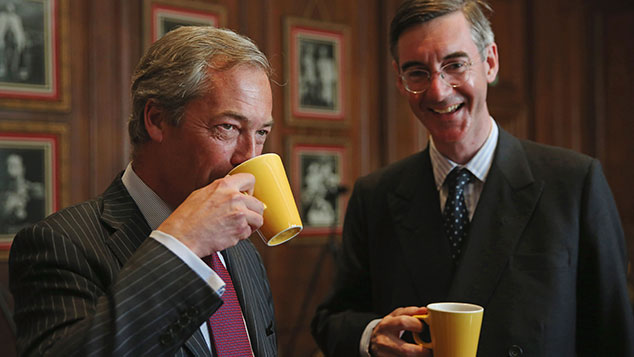
Boris, Michael Gove and a blue passport in human form – this is the trio that could soon lead the country. Alex Rankine reports.
“Will Brexit really mean Brexit?” asks Stephen Bush in the New Statesman. That’s what’s worrying “ultra-Brexiteers” following reports that Prime Minister Theresa May’s advisers are “secretly mulling” over whether the UK could stay in some form of customs union. The deal would cover goods, but give us “the right to strike our own trade deals for services, which covers the bulk of the British economy”.
Such talk has sparked yet more Tory plotting, says Tim Shipman and Caroline Wheeler in The Sunday Times. MPs warn that, if May persists, she “will face a coup that would install a ‘dream team’ of ‘three Brexiteers’”, with Boris Johnson as prime minister, Michael Gove as deputy and backbencher Jacob Rees-Mogg as chancellor. Rees-Mogg has accused the Treasury of “fiddling the figures” on Brexit and rejected a customs deal, while Johnson and Gove have vowed to fight the idea from inside the cabinet.
Someone must take the wheel
Plotting is all very well, says George Parker in the Financial Times, but “there is no united front among pro-Leave cabinet ministers on what exactly the end state of Britain’s EU relationship should be”.
David Davis, the pro-Leave Brexit secretary, has “formed an unlikely alliance” with Chancellor Philip Hammond to favour options that “minimise the impact of exit on business”. And Johnson “eschews detail at cabinet meetings… ‘He just waves his arms around and talks about taking back control,’ says one cabinet member.”
The government needs May to lead, argues James Forsyth in The Spectator. But she “has become so frightened of putting a foot wrong” since last year’s disastrous general election “that she’s now extremely reluctant to confront any controversial issue”.
The Tory response to this has traditionally been “regicide”, says Andrew Rawnsley in The Guardian. Yet many MPs fear that the consequences of a leadership election “would be too awful”. A new leader would be chosen by the membership, which is “rather elderly, predominantly male and overwhelmingly in favour of a hard Brexit”.
Cometh the hour, cometh Rees-Mogg
That means Rees-Mogg is likely to end up in charge. And “a Rees-Mogg-led Conservative Party would be crucified in an election”, says The Economist’s Bagehot column. Yet with Johnson and Gove bound by collective cabinet responsibility, “Rees-Mogg has emerged as the leader of the ultra-Brexiteer faction”.
The man is “the blue passport in human form, the red telephone box made flesh”, and the party grassroots love him for it. Others nickname him “the honourable member for the 18th century”. Yet Rees-Mogg is “popular on the right for the same reason that Corbyn is popular on the left”. Supporters read their non-conformism as “proof of their authenticity”.
There are striking similarities between the two, agrees Hugo Rifkind in The Times. “Neither are really politicians at all but standard-bearers in a great national clash of values.” UK politics is becoming “far more American” in style, so “most likely, Britain’s next election will be our first culture-war election.” And that moment could be upon us sooner than expected, says Forsyth. The local elections are coming up in the next few months. If May leads the Conservative Party “into a series of historic defeats, there will be a reckoning.”
Korea: Olympic truce, then war?
South Korea’s president, Moon Jae-in, has “engineered a period of detente with Pyongyang that looks to have ensured” the success of the Winter Olympic games and “the peaceful participation of the North’s regime”, says Bryan Harris in the Financial Times. The Koreas will “march together during the opening ceremony under a ‘unification flag’”, and Kim Jong-un’s younger sister, Kim Yo-jong, and Kim Yong-nam, the head of the North’s parliament, are set to attend. A unified Korean women’s ice hockey team played its first match this week. But “at what cost”?
North Korea hopes to undermine Seoul’s alliance with the US by appealing to “southern sentiments about bringing together the ‘ethnic community’ of Koreans”, notes Andray Abrahamian on Reuters. Yet polls shows that many younger South Koreans oppose “giving their hard-earned roster spots on their national hockey team to North Koreans”, with President Moon’s approval rating dipping due to the policy.
To be fair, “Moon has made it clear that his government will not be seduced by the Olympic spirit”, says Christopher Hill in The Japan Times. “Once the games are over, the North will be facing a long winter of opprobrium and isolation.”
Indeed, the situation could be even more serious than that, says Roger Boyes in The Times. If US press reports are to be believed, the “supposed Olympic truce may well be a short lull before a limited, but devastating attack on Kim Jong-un’s nuclear arsenal”. This “‘bloody nose’ scenario” is allegedly being discussed in the White House. Someone needs to remind President Donald Trump that “limited” wars “have a habit of getting out of control”.